 |
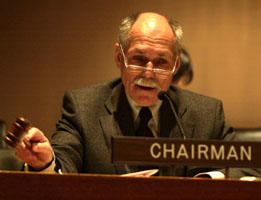 |
| Photo:
CSD-9 Chair Bedrich Moldan (Czech Republic) calls to order the
9th Session of the Commission on Sustainable Development
|
The ninth session
of the UN Commission on Sustainable Development (CSD-9) opened at
UN Headquarters in New York. During a brief morning session, delegates
heard opening statements, elected memebers of the bureau and considered
the agenda and organizational matters. Delegates also heard reports
of the CSD intersessional working groups and the Open-Ended expert
Group Meetings on Energy and Sustainable Development. The afternoon
session was dedicated to the first Multi-stakeholder Dialogue on
achieving equitable access to sustainable development.
|
|
ENB
Daily Reports
|
|
|
Mon 16
|

|
|
|
|
Tue 17
|
|
|
|
|
Wed 18
|
|
|
|
|
Thu 19
|

|
|
|
|
Fri 20
|
|
|
|
|
Mon 23
|
 |
|
|
|
Tue 24
|
 |
|
|
|
Wed 25
|
|
|
|
|
Thu 26
|
|
|
|
|
Fri 27
|
|
|
|
|
Mon 30
|
|
|
|
|
Tue 01
|
|
|
|
|
Wed 02
|
|
|
|
 * To view PDF files, * To view PDF files,
you will need the free Adobe Acrobat Reader:
 * To listen to Real Audio
files, you will need the free Real Audio player: * To listen to Real Audio
files, you will need the free Real Audio player:
|
 Nitin
Desai, Under-Secretary-General for Economic and Social Affairs,
highlighted the theme of energy, an area in which the CSD had added
value to the work of the UN. He said: CSD-9 is the first UN meeting
where energy is being discussed as a sectoral issue; that energy
needs of populations and access to energy should be addressed as
priorities, including by the CSD; and, noting that many concerns
about the availability of sustainable development resources are
linked to energy, suggested merging the CSD agenda with that of
poverty eradication. He said health impacts, financing, technology
transfer, institutional issues of implementation, stakeholder involvement,
and ethics of global responsibility should be addressed, which would
mean CSD-9 could be a template for addressing global concerns in
other areas.
Nitin
Desai, Under-Secretary-General for Economic and Social Affairs,
highlighted the theme of energy, an area in which the CSD had added
value to the work of the UN. He said: CSD-9 is the first UN meeting
where energy is being discussed as a sectoral issue; that energy
needs of populations and access to energy should be addressed as
priorities, including by the CSD; and, noting that many concerns
about the availability of sustainable development resources are
linked to energy, suggested merging the CSD agenda with that of
poverty eradication. He said health impacts, financing, technology
transfer, institutional issues of implementation, stakeholder involvement,
and ethics of global responsibility should be addressed, which would
mean CSD-9 could be a template for addressing global concerns in
other areas. |
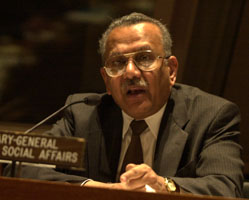 |
 |
 CSD-9 Chair
Bedrich Moldan (Czech Republic) opened CSD-9, underscored the
role of the CSD in monitoring progress and achievements toward sustainable
development, and said he expected the World Summit on Sustainable
Development in 2002 to be discussed during the High-level Segment.
CSD-9 Chair
Bedrich Moldan (Czech Republic) opened CSD-9, underscored the
role of the CSD in monitoring progress and achievements toward sustainable
development, and said he expected the World Summit on Sustainable
Development in 2002 to be discussed during the High-level Segment.
|
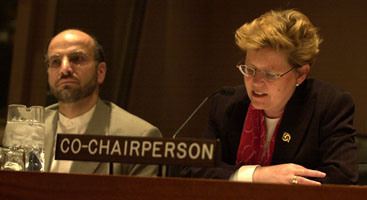 The
report of the Second Session of the Ad Hoc Open-ended Intergovernmental
Group of Experts on Energy and Sustainable Development (E/CN.17/2001/15)
was presented by Irene Freudenschuss-Reichl (Austria), Co-Chair of the
Group. She said there is no hope that internationally-agreed development
targets can be met if there is no progress on access to energy. Co-Chair
Mohammad Reza Salamat (Iran) noted that while the group had managed to
agree on many paragraphs in the negotiated text, they had failed to reach
agreement on text relating to nuclear energy technologies, international
cooperation, and the function of markets. Bracketed text on these issues
has been transmitted to CSD-9. The
report of the Second Session of the Ad Hoc Open-ended Intergovernmental
Group of Experts on Energy and Sustainable Development (E/CN.17/2001/15)
was presented by Irene Freudenschuss-Reichl (Austria), Co-Chair of the
Group. She said there is no hope that internationally-agreed development
targets can be met if there is no progress on access to energy. Co-Chair
Mohammad Reza Salamat (Iran) noted that while the group had managed to
agree on many paragraphs in the negotiated text, they had failed to reach
agreement on text relating to nuclear energy technologies, international
cooperation, and the function of markets. Bracketed text on these issues
has been transmitted to CSD-9.
 Co-Chair Irene
Freudenschuss-Reichl (Austria)
Co-Chair Irene
Freudenschuss-Reichl (Austria)
 Co-Chair
Mohammad
Reza Salamat (Iran) Co-Chair
Mohammad
Reza Salamat (Iran)
|
CSD-9
Chair Bedrich Moldan with the Co-Chairs of the Energy Group (left)
and with JoAnne DiSano, Director, Division for Sustainable Development
(right)
|
|
Photos:
Kimo Goree, Managing Editor, ENB, speaking with Bremley Lyngdoh,
Columbia University graduate student before the morning session
begins (left); and Nitin Desai (right)
|
| Multi-Stakeholder Dialogue Segment on Energy and
Transport: Achieving Equitable Access to Sustainable Energy |
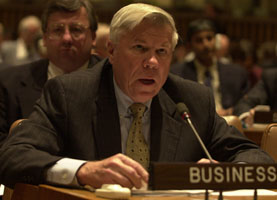 |

Business:
Jim
Adam, World Energy Council, speaking on behalf of industry,
emphasized the need for greater energy access, availability and
acceptability, and urged actions relating to, inter alia, reforming
markets, reducing political risk and improving energy efficiency.
|

Science:
R.K.
Pachauri, Tata Energy Institute, India, speaking for the scientific
and technical community, urged the phasing-out of subsidies, underlined
the value of decentralized energy and the need to build local
institutional capacity, and expressed concern with the decline
of support for research and development.
|
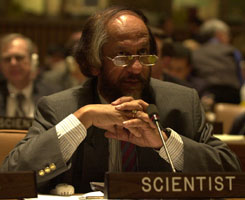 |
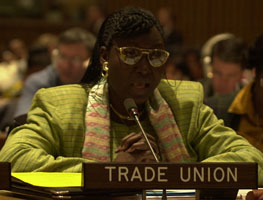 |

Trade Unions:
Mamounata
Cisse, International Confederation of Free Trade Unions, emphasized
the need for greater worker participation in energy production decisions,
called for ratification of ILO Convention 155 on worker health,
highlighted concerns with transport-related accidents, and urged
greater support for research into the employment implications of
the transition to sustainable energy.
|
Local
Authories: Councilor Parks Tau, International Council for
Local Environmental Initiatives' Delegation of Local Authorities,
Johannesburg (left) and Mayor Cesar Maia, Rio de Janeiro, speaking
for local authorities, noted that the poor often lack access to
commercial energy, and urged greater investment in renewable and
cleaner energy and in energy efficiency.
|

NGOs:
Shanthi
Sachithanandam, Christian Aid, speaking for NGOs, urged governments
to: immediately phase-out nuclear energy; place a moratorium on
the extraction of fossil fuels from environmentally-sensitive
areas; impose a carbon-based fuel tax; and cease building large-scale
dams. She advocated the creation of a new UN agency to promote
renewable and sustainable energy.
|
|
|
|
The
Plenary Hall during the Multi-stakeholder Dialogue
|
|
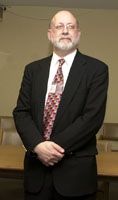 Side
Events: Clean Energy Technologies: Solutions to Economic Environmental
and Sustainable Development Challenges: Business Perspectives on
Climate Solutions Organized
by the Business Council for Sustainable Energy (BCSE) Side
Events: Clean Energy Technologies: Solutions to Economic Environmental
and Sustainable Development Challenges: Business Perspectives on
Climate Solutions Organized
by the Business Council for Sustainable Energy (BCSE)
Photo: John
Palmisano, Managing Director, Evolution Markets
|
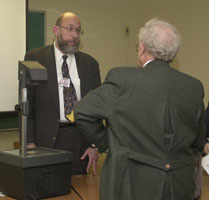 |
Scott
Sklar, President, The Stella Group |
| Side Events: Indigenous Peoples Energy and Atmosphere Organized
by the Indigenous Peoples' International Centre for Policy Research
and Education (Tebtebba Foundation) and International Indian Treaty
Council |
|
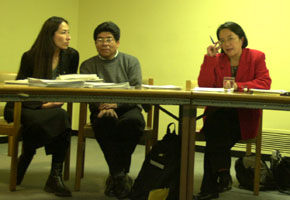 Sarah
James, International Indian Treaty Council, Moises Gutierrez, Bolivia,
Taypi Ceque, and Victoria Tauli-Corpuz, Tebtebba. Speakers highlighted
overarching issues such as damages to indigenous lands as well as
human rights and collective rights issues, and religious and spiritual
rights issues. They advocated a more conservation oriented approach
to sustainable development. Speakers also highlighted the negative
impacts of climate change on indigenous people and indigenous lands,
such as the peeling of icecaps in the Arctic. She also highlighted
indigenous participation in the climate change negotiations. Sarah
James, International Indian Treaty Council, Moises Gutierrez, Bolivia,
Taypi Ceque, and Victoria Tauli-Corpuz, Tebtebba. Speakers highlighted
overarching issues such as damages to indigenous lands as well as
human rights and collective rights issues, and religious and spiritual
rights issues. They advocated a more conservation oriented approach
to sustainable development. Speakers also highlighted the negative
impacts of climate change on indigenous people and indigenous lands,
such as the peeling of icecaps in the Arctic. She also highlighted
indigenous participation in the climate change negotiations.
For more information
visit: www.tebtebba.org
|
|
|